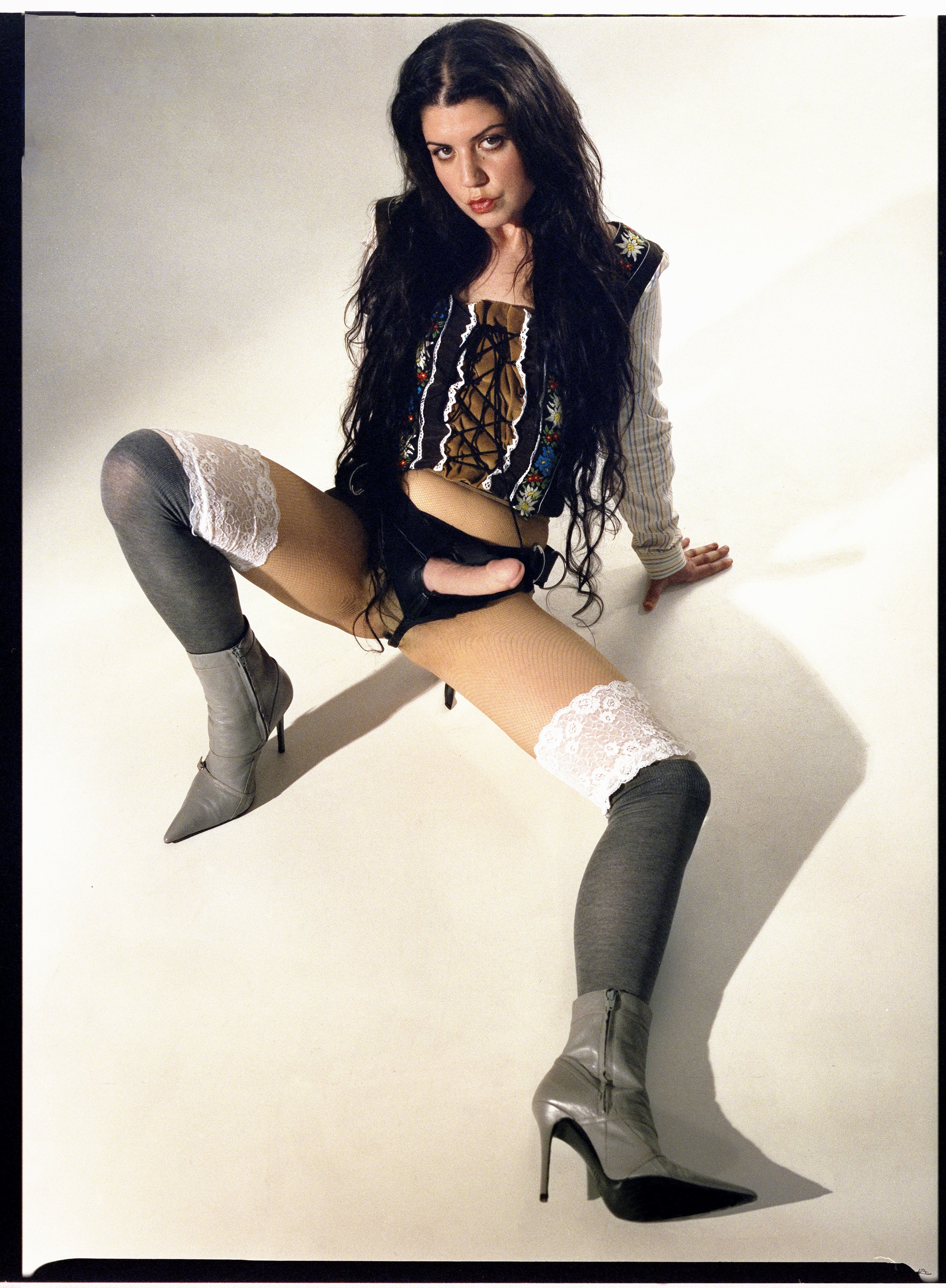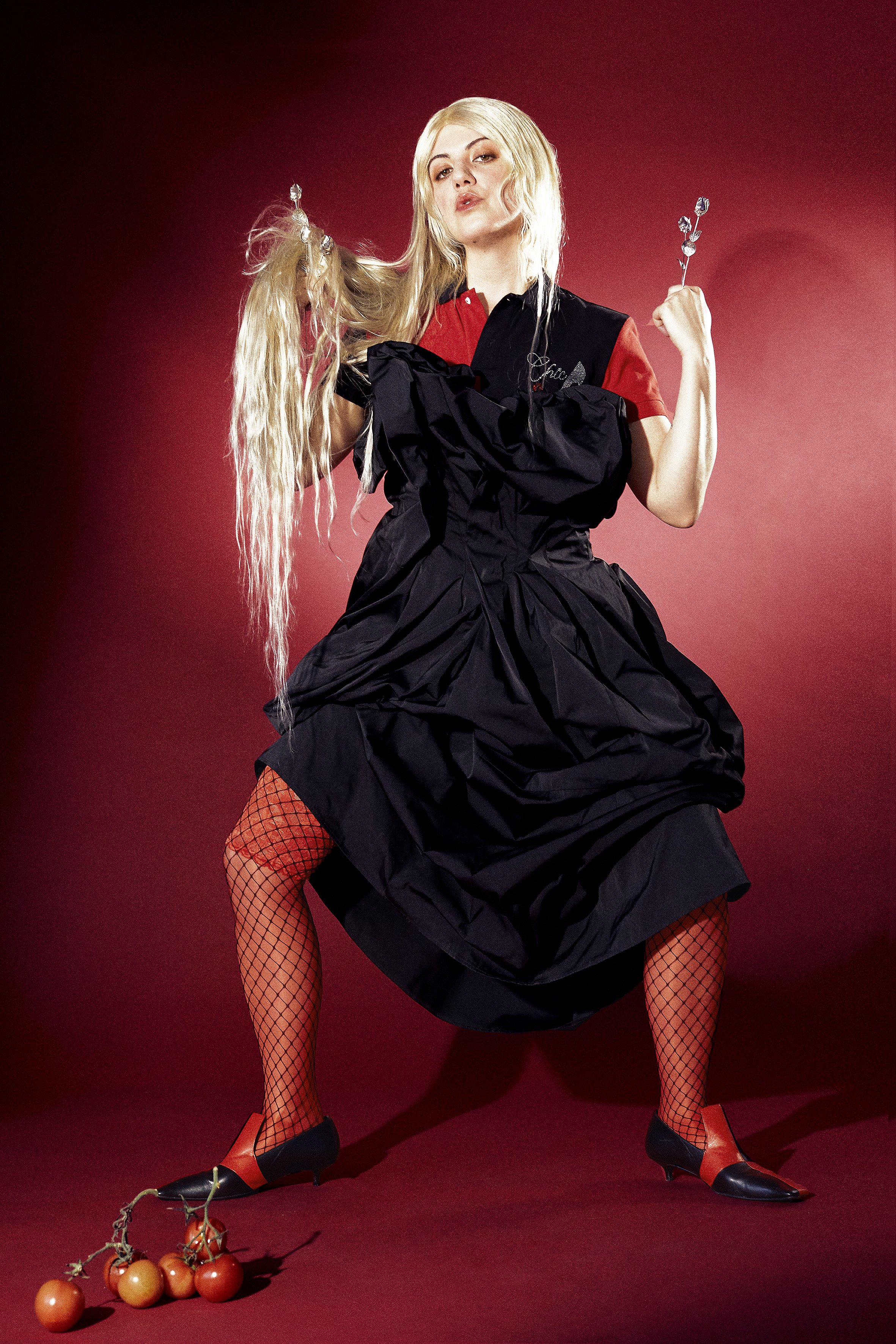photography by Isotta Giulia Acquati
styling & art direction by Hakan Solak
concept & direction by Krista Papista
hair by Dushan Petrovich
make-up by Lee Hyangsoon
set design by Jillian Van Koutrik
styling assisting by Aleix Llussà Lòpez
production by Laura Howes
interviewed by Elena Parpa
“Fucklore delves into the pockets of anarchy, mourning and exuberance in traditional styles, sounds and ceremonies that survive on the edge between the existentially worn-out and the ferociously alive.”
“Sonnenallee” is one of the thirteen tracks in Fucklore, Krista Papista’s new album to be released on July 22, 2022. Its material is the sonic environment of a place at a particular moment: A street in Berlin (Sonnenallee avenue) that is the heart of the city’s Middle Eastern community beating to the sound of dabke music blasted from cars after the Ramadan. Krista Papista lives nearby. She composed the song in response to the street’s soundscape, using fm and analogue synthesizers, asking her friend Kiki Moorse, one of the founding members of Chicks on Speed, to write the lyrics. In the album, the song is part of a musical and conceptual re-interpretation of notions of the folklore. It is also indicative of how the artist works: in relation to places and in defiance of the mainstream, queering traditions and customs, which she seeks to re-invent often in a collaborative spirit. Of “Sonnenallee” Krista Papista says that it functions as a shit-show that mixes Middle Eastern and Greek music (sirtaki most prominently) with contemporary electronic rabbit holes. I relate to what she means, when I play the album in my car driving in Nicosia (Cyprus), testing the way her songs perforate the soundscape of her city of origin. The intentional disharmonic blend of sounds and musical references is dizzying, built on tensions between known folk tunes and the electronic. As for the lyrics, they oscillate between the poetic, the absurd and the sexually explicit, sometimes functioning as reflections on our current moment of (political, financial, cultural, and environmental) collapse, melding the personal with the political. In the album’s track list, a song on five hours of period cramps follows a song on the murders of migrant women by an army officer in Cyprus. Their story is most hauntingly evoked in the album’s cover that pictures the dark red waters of a dam that punctuates the landscape like a gigantic open wound. With this in mind, Fucklore is not just an attempt to re-imagine the possibilities of folk music. It is also a protest against tactics of oppression, discrimination and marginalization that is carried out with forthrightness, unapologetic self-determination and a dildo between the legs.
ELENA PARPA: “Livia, Elena, Maricar, Mary Rose, Sierra, Arian, Asmita” is the song in Fucklore dedicated to the five migrant women and their two daughters, who were brutally murdered in Cyprus in 2019. Can you talk a bit about the reasons you have decided to pay tribute to these women?
KRISTA PAPISTA: I have always felt concerned and disgusted by the racist and inhumane way the Cypriots treat migrant workers. As a white Cypriot girl, it’s not my position to talk for them, but the tragic story of the lives of Livia, Elena, Maricar, Mary Rose, Sierra, Arian, and Asmita should be carved in history. I chose to write songs to pay a tribute to their lives and to declare the anger we have felt for their loss. The album cover is a photo I took of the contaminated orange lake near a mining area in Cyprus, where the women’s bodies were thrown inside suitcases. I invited my friend, artist Alfatih to do an intervention and we created this image which is a precise portrayal, I would say, of the Mediterranean cultural amalgam I grew up in and know.
PARPA: This observation links somewhat to my next question. You live in Berlin but your work is informed by references and ideas drawn from your region of origin, the Mediterranean and Cyprus in particular. In what ways has living in a city like Berlin helped you reconnect with where you come from?
PAPISTA: Reflecting and drawing ideas from my background, or from the culture I grew up in, happens instinctually, then more in depth when I research, speculating on my ideas and concerns. In the process of creating my own narrative through my art and life, examining and re-imagining the history of my culture functions as a spring board for my creative thinking. There are endless issues unresolved in the Mediterranean, in Cyprus especially, and I am here to address them and talk about some of them in my work. At the same time, living in a place like Berlin, I have the luxury to disconnect from my country’s bullshit, exploring my creative, philosophical, psychological, and sexual curiosities. When you have lived away from your country for over a decade as I have, you start to re-imagine it, queer it and take the wisdom, the aesthetics, the philosophies, and the rituals that you think are the ones worth taking and embodying. In the process, you create your own culture, your own religion, your own country. That’s what I’m doing with my work.
PARPA: What do you mean with the term ‘queer’ in this instance? Do you understand it as a strategy, an attitude, or a way of being?
PAPISTA: The way I see it, I am a queer woman, living an openly queer life, and in my work you will see and feel that. It is not a strategy or an attitude. In fact, it’s simply a way of being.
PARPA: I have connected to Fucklore as an electrifying musical experiment that eclectically mixes electronic soundscapes with hip-hop, post-industrial, psychedelic beats and folk influences from the Balkans, the Mediterranean and the Middle East. I also relate to it as an abrasive statement and a protest against essentialist uses and conceptualizations of the folklore in nationalist projects, especially in places marked by ethno-political division and colonialism, such as Cyprus. How do you hope to remix and re-think the concept of folklore in this album?
PAPISTA: That is a precise description of some of the conceptual intentions behind the album. By naming the album Fucklore, I am declaring a contemporary, more self-aware version of folklore. Fucklore explores sounds from Anatolia, the Middle East and the Balkans, focusing on the harrowing treatment and murder of migrant women in the Mediterranean; the dark and prevalent subject-matter counteracting my reimagining of the traditional folklore of these areas. Fucklore opposes the way that modern nationalist projects made use of notions of the folklore in order to fabricate a romanticized, falsified and cleansed narrative of the nation in patriarchal identitarian terms. Fucklore rejects the implicit nationalist presuppositions that define the study of folklore. It delves, instead, into the pockets of anarchy, mourning and exuberance in traditional styles, sounds and ceremonies that survive on the edge between the existentially worn-out and the ferociously alive. Fucklore channels, collages and queers them, embodying the many voices that are spoken, including a voice that is unmistakably mine.
PARPA: Can you share some insights into your processes of composing? In what kind of atmosphere do you feel most creative? What objects, images and sounds accompany you when putting things together?
PAPISTA: I have a studio in my home, where I keep the surroundings fairly minimal; there’s just a bunch of equipment, instruments, books and plants. There’s a lot of intensity, chaos, and curiosities during the process of making work, so it helps if my physical, waking surrounding is kind of in order. The process of seeking inspiration is a different story. I have a diary where I write ideas, lyrics, and texts. I also record a lot of melodies I come up with on my phone, and when I begin working, I just start collaging things together for days until I have something.
PARPA: Your albums are accompanied by videos and images, which are distinguished by an energetic, fierce sexuality. Would you say that shock and disruption are tactics you like to apply?
PAPISTA: Not really, I don’t find my art shocking at all…
PARPA: In the years that I have followed your work, you have experimented across different fields, including music and poetry, the visual and performing arts. How do you identify yourself?
PAPISTA: It’s really not that complicated; I’m an artist. Sometimes I make music, sometimes I draw, sometimes I make visuals, sometimes I perform, sometimes I write, sometimes I do nothing.



